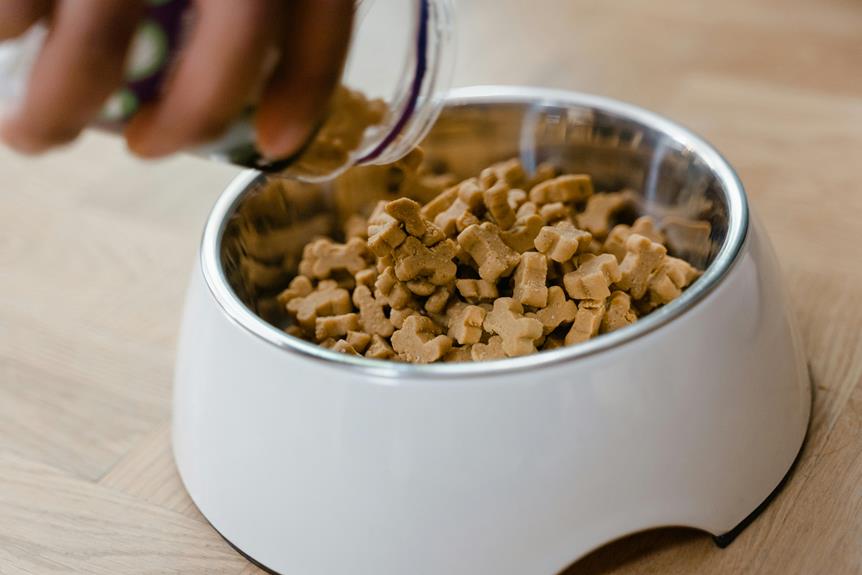
Ensuring your dog receives proper nutrition is crucial for their well-being. From understanding your dog's unique dietary requirements to selecting high-quality ingredients, there are various factors to consider in providing a balanced diet. But what about the importance of timing when it comes to feeding your furry companion?
Understanding Your Dog's Nutritional Needs
To ensure your dog receives proper nutrition, understanding their specific dietary requirements is crucial. Dogs require a balanced diet that includes proteins, fats, carbohydrates, vitamins, and minerals. Proteins are vital for muscle development and overall health. High-quality sources, like chicken or fish, are ideal for your furry friend. Fats provide essential fatty acids for energy and a healthy coat. Opt for healthy fats such as those found in salmon or flaxseed.
Carbohydrates, like grains and vegetables, offer energy and fiber. Vitamins and minerals play a significant role in supporting various bodily functions. Vitamin-rich foods such as carrots or spinach can enhance your dog's well-being. Minerals like calcium and phosphorus are essential for bone health. Water is also crucial for hydration and proper digestion.
Importance of Quality Ingredients
Understanding the significance of quality ingredients is essential for providing your dog with optimal nutrition and overall well-being. When it comes to your dog's food, the quality of ingredients directly impacts their health and vitality.
High-quality ingredients, such as real meat, vegetables, and whole grains, provide essential nutrients like protein, vitamins, and minerals that your dog needs to thrive. On the other hand, low-quality ingredients, such as fillers, artificial flavors, and by-products, can be detrimental to your dog's health and may lead to various health issues in the long run.
Choosing the Right Dog Food
Consider important factors like your dog's age, size, and activity level when choosing the right dog food for their specific needs. Puppies, adult dogs, and senior dogs have different nutritional requirements, so opt for a formula tailored to your dog's life stage. Larger breeds may benefit from food designed to support joint health and prevent obesity, while smaller breeds might need smaller kibble sizes to aid digestion. Active dogs will require a diet higher in protein and fat to sustain their energy levels, compared to less active or sedentary dogs.
Look for dog foods that list a high-quality protein source as the first ingredient, such as chicken, beef, or fish. Avoid foods with excessive fillers like corn, wheat, or soy, as these offer little nutritional value. Some dogs may have specific dietary needs, such as grain-free or limited ingredient diets, so consult with your veterinarian if you suspect your dog has food sensitivities. Ultimately, the best dog food is one that meets your dog's individual requirements, so take the time to read labels and choose wisely.
Implementing a Balanced Diet
When implementing a balanced diet for your dog, focus on providing a variety of nutrients essential for their overall health and well-being. A balanced diet should include high-quality protein sources like chicken, beef, or fish to support muscle development and repair.
Incorporate healthy fats from sources like fish oil or flaxseed to promote a shiny coat and healthy skin. Carbohydrates from sources like brown rice or sweet potatoes can provide energy for your furry friend's daily activities.
Remember to include a mix of vitamins and minerals, either through a well-rounded commercial dog food or vet-approved supplements. Fresh fruits and vegetables can also be great additions to your dog's diet, offering essential vitamins and fiber.
Be mindful of portion control to prevent obesity and related health issues. Lastly, always ensure your dog has access to clean water throughout the day to support digestion and overall hydration.




